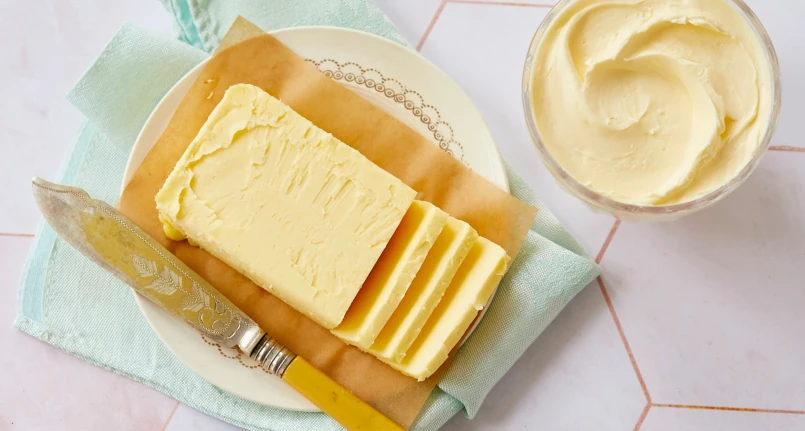The general rule is now known to many: an excess of saturated fats (contained in butter ) and trans or hydrogenated fatty acids (contained in margarine ) increases the risk of developing cardiovascular pathologies and some forms of cancer.
However, the question often arises which of these two types of fat is potentially more harmful. So, is it better to use butter or margarine in the kitchen?
Limiting them both would obviously be the simplest and most spontaneous answer; however, wanting to go deeper into the matter from a biochemical point of view, we come to the conclusion that between the two it is generally preferable to use butter.
Margarine is in fact a fat that does not exist in nature but derives from a mix of vegetable oils – sometimes with the addition of animal fats – processed through industrial chemical processes.
First point against margarine : the fats and oils used to make it are often of poor quality and with very low food value. For example, tropical oils are used, such as palm and palm kernel oils .
Since vegetable oils are liquid in nature, they are made solid by chemical processes, among which hydrogenation stands out .
Second point against margarine : the hydrogenation process inactivates some substances that are positive for the body; moreover, it alters the structure of some fatty acids with negative repercussions on cardiovascular health: it has in fact been seen that a diet rich in trans hydrogenated fats increases the levels of low-density lipoproteins , the famous LDL or bad cholesterol .
Third point against margarine : recent studies have shown that a margarine rich in trans fatty acids , unlike butter, not only increases the so-called bad cholesterol , but at the same time decreases the good one, with highly deleterious effects on our health.
Having to choose between butter and margarine, it is therefore better to prefer the former, paying attention to its quality and origin and, of course, without exaggerating with the quantities. From an energy point of view, both foods have the same caloric value.
The 100% vegetable margarine is cholesterol-free and this characteristic is often well advertised on the packaging, almost as if it were a healthy food and preferable to butter.
The Revenge of Margarines – Dietary or Functional Margarines
The food industry has responded to concerns about excess trans fat in the diet by developing production processes that bypass traditional hydrogenation. Today, margarines “free from hydrogenated fatty acids ” (with a negligible content of trans fatty acids) can also be found on the market ; not only that, we can also find margarines fortified with plant sterols and omega-three , both with positive effects on blood cholesterol and triglyceride levels, but also with Vitamin D , which in addition to the well-known effect on bone health could contribute to the reduction of cardiovascular risk. These new generation products can be considered a sort of “revenge of margarines” which thus become a better food than butter in terms of metabolic impact and cardiovascular health . However, the doubt remains about the quality of the oils used in their production, which at least in theory cannot ignore the use of a certain percentage of coconut and palm oils . More generally, the solidity of margarine requires, for physical reasons, the presence of a certain amount of saturated fatty acids . Therefore, in the absence of functional moleculesadditions (omega-three, sterols, vitamin D, vitamin E, etc.) it is questionable to consider a non-hydrogenated vegetable margarine better than butter, also in consideration of its highly elaborated nature (extraction and chemical refining of oils, interesterification with chemical catalysts , etc. .).
Finally, it should be remembered that margarine is found in many pre-packaged foods such as small pasta, biscuits and the like, so it is advisable to also limit the intake of these foods and read the nutritional labels carefully when purchasing them. For these uses, in fact, cheap “old generation” industrial margarines are often used, therefore rich in trans fatty acids.
Other articles on ‘Butter or margarine?’
- Butter or margarine?
- Butter
- Buttering
- Butter: nutritional value and classification




